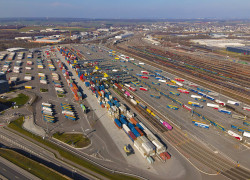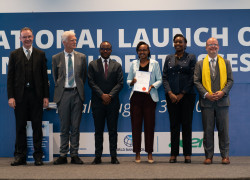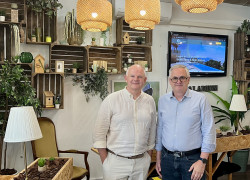AI is on, mind the skills gap! PwC's 22nd CEO Survey – Luxembourg Revealed
Looking ahead to 2019, CEOs in Luxembourg are confident about their organisation’s revenue growth prospects over the short and medium term. They are also largely optimistic about local economic growth prospects. Despite this, many are cautious when considering the global state of the economy and are even pessimistic about Europe.
Luxembourg’s business leaders remain mindful of the challenges that are placed in front of them by the increasingly complex world in which we live. One of these challenges arises from Data and AI, where, despite the progress made in this area, there is still a significant gap in the information available to decision makers. A second challenge is found where CEOs globally and locally confirm they are confronted with a need for higher skills, but have an increasingly hard time finding that talent. This has resulted in a growing skills gap.
In line with the Global PwC CEO survey
For the past 22 years, PwC Global has conducted a survey of CEOs around the world to collect their views about growth, and understand the trends reshaping business and society. The main findings of the Global survey are revealed at the Davos conference ever January. Following this, the PwC country and industry findings are released and the result is a very comprehensive picture.
This is the second year PwC Luxembourg had participated and the result are now available. The goal was to provide our people and society at large with an insight into what our business leaders think about the current economic outlook in Luxembourg, and how they are planning for the future.
Growth: Optimism is more local than global
Looking ahead to 2019, CEOs in Luxembourg are confident about their organisation’s revenue growth prospects over the short and medium term. They are also largely optimistic about local economic growth prospects. Despite this, many are cautious when considering the global state of the economy and are even pessimistic about Europe.
François Mousel, Partner, Clients and Markets Leader, PwC Luxembourg, adds: "This may seem at first a little conflicting. This may reflect the confidence in policymakers that our country will be able to attract enough foreign investment to generate this growth despite a general collapse, but it is up to the Government to put in place value propositions, not just fiscal or regulatory ones, to get there."
Regarding countries for expansion, the traditional destinations of Germany, France, Belgium and the UK are losing ground among Luxembourg’s CEOs while no new destination seems to emerge. Despite this, Germany and France are still top choices and the US rounds off the top three as Luxembourg’s CEOs search for opportunities outside Europe. Notably, China has risen in the ranks and now shares the 5th position with Italy. The Luxembourg government’s attempts to attract Chinese players has clearly born fruit.
Threats and opportunities
Over-regulation, availability of key skills, and the speed of technological change are at the top of Luxembourg CEO’s concerns. Among CEOs who expressed worry over trade conflicts, an overwhelming majority both in Luxembourg and around the globe consider the US-China trade conflict to be particularly concerning given the potential global consequences. This is followed by the trade conflict between the European Union and the US.
In light of these concerns, at a global level, 45% of CEOs are adjusting their supply and sourcing strategy while a quarter are looking to alternative territories for growth. Meanwhile, in contrast to the global trend, a staggering 54% of Luxembourg's CEOs plan to make no changes to their operating model and growth strategy.
Data and AI
Over 80% of Luxembourg's CEOs believe that AI will significantly change the way they do business. But when it comes to being able to support decision making, there is still a divide between the information business leaders want and how comprehensive they feel the data is. Luxembourg's CEOs consider data about customers’ needs as most important. This is followed by financial forecasts, data about brand & reputation, business risks and employees’ needs. However, taking an average from of all these cases mentioned, just 29% of respondents view the data available to them as adequate.
This highlights how despite the progress made in data and AI, there is still a significant gap in the information available to decision makers. We wanted to know what was at the root of this alarming reality, so we asked Luxembourg's CEOs to list the primary reasons why the data is not adequate. More than 40% of Luxembourg's CEOs attributed the information gap to a lack of analytical talent.
Laurent Probst, Partner, Digital Transformation and Public Sector, PwC Luxembourg, states: "We see all the public and private leaders of Luxembourg preparing to integrate the wave of new technologies and a new business framework related to artificial intelligence. Luxembourg already has a certain number of European-wide assets and projects that point to the country's position as one of the European leaders. Success will however be linked to the development and provision of skills for all sectors. "
Skills gap: The talent gap is increasing people costs, affecting the ability to innovate and impacting customer experience
CEOs globally and locally confirmed that they are confronted with a need for higher skills. We asked them about the impact this may have on their organisation’s growth prospects.
A majority of Luxembourg CEOs stated that the talent gap is increasing people costs, affecting the ability to innovate and impacting customer experience. As availability of key skills is a threat to growth, many businesses are having to reflect on how to attract, train and retain their workforce. This can include multiple aspects, from upskilling and partnering with leading education institutions to offering new mobility solutions for employees looking to work away from the office.
About this survey
Luxembourg participated for the first time in 2017 from a sample of 49 CEOs. This year, the survey was conducted from a sample of 59 CEOs from various industries, such as asset management, automotive, banking, healthcare and pharma life sciences, ICT, insurance, manufacturing, transportation and logistics, and wholesale and retail trade. Responses were collected from September until early November 2018. Following the collection of data, we performed an analysis in order to determine patterns and trends in Luxembourg. The main findings can be found on our dedicated website.
Communiqués liés
RSA launches technology and management liability insurance s...
RSA Luxembourg, part of Intact Insurance Specialty Solutions, today announces th...
Lancement d'une nouvelle connexion intermodale entre Bettemb...
CFL multimodal a le plaisir d'annoncer le lancement de sa nouvelle connexion i...
Experts from LUNEX award first micro-credentials in Rwanda o...
The Rwanda Ministry of Education (MINEDUC) formally inaugurated Syllabi, a publi...
ERG Notes that ENRC Secures Landmark Victory as Court of App...
Eurasian Resources Group (ERG), a leading diversified natural resources group he...
LetzToken et La Vie est Belle annoncent leur partenariat ouv...
«?LetzToken?», plateforme de tokenisation pionnière basée à Luxembourg, et ...
ERG announces a Pre-Export Finance Facility Agreement based ...
Eurasian Resources Group (“ERG”, “The Group”), a leading diversified nat...
Il n'y a aucun résultat pour votre recherche







